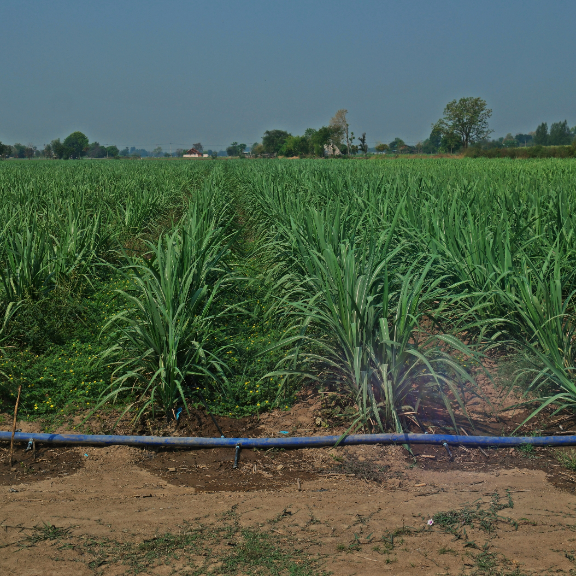Soil Moisture Management
Soil moisture management is a cornerstone of successful sugarcane cultivation, as this thirsty crop heavily relies on consistent and adequate water throughout its growth cycle. Effectively managing soil moisture not only promotes optimal growth but also significantly influences the quantity and quality of sugar yield. Here's a comprehensive guide to mastering soil moisture management in sugarcane cultivation:
1. Understanding Sugarcane Water Needs:
- Sugarcane is a water-intensive crop, with distinct water requirements during different growth stages. Understanding these needs is fundamental to designing an effective soil moisture management strategy.
2. Soil Moisture Monitoring Systems:
- Implementing soil moisture monitoring systems is crucial. Various technologies, including soil moisture sensors and tensiometers, provide real-time data on soil water content. This enables farmers to make informed decisions about when and how much to irrigate.
3. Irrigation Scheduling:
- Develop a precise irrigation schedule aligned with sugarcane growth stages. Early growth phases, tillering, and maturation each demand specific moisture levels. An effective schedule ensures that the crop receives the right amount of water at the right time, preventing both water stress and wastage.
4. Drip Irrigation Systems:
- Drip irrigation is an efficient method for delivering water directly to the root zone of sugarcane plants. This not only conserves water but also minimizes the risk of diseases associated with overhead irrigation. Drip systems allow for controlled and targeted moisture delivery.
5. Mulching Practices:
- Mulching is a valuable practice for soil moisture conservation. Applying organic or synthetic mulch around sugarcane plants reduces evaporation, suppresses weed growth, and helps maintain a more even soil moisture profile. Mulching is particularly beneficial in regions with higher temperatures and evaporation rates.
6. Rainfall Management:
- While sugarcane requires consistent moisture, excessive rainfall can lead to waterlogging and adversely affect root health. Effective soil drainage systems are essential to prevent waterlogging and ensure that excess rainwater is efficiently channeled away from the crop.
7. Soil Texture Considerations:
- Different soil textures retain moisture differently. Sandy soils drain quickly, while clayey soils retain water for more extended periods. Understanding the soil texture in your sugarcane fields helps tailor irrigation practices to optimize water use efficiency.
8. Evapotranspiration Monitoring:
- Keep an eye on evapotranspiration rates, which indicate the combined water loss from both the soil surface and plant leaves. This information aids in adjusting irrigation schedules based on the crop's actual water needs.
9. Water Quality Assessment:
- The quality of irrigation water is crucial for soil health and moisture management. Regularly assess water quality to identify any potential issues, such as salinity, which can impact soil moisture retention.
10. Precision Agriculture Techniques:
- Embrace precision agriculture techniques, incorporating data from soil moisture sensors and satellite imagery. Precision agriculture allows for site-specific adjustments, optimizing irrigation and minimizing water wastage.
11. Adaptive Strategies for Drought Conditions:
- Develop adaptive strategies for periods of drought. This may involve adjusting planting schedules, prioritizing water use for critical growth stages, and implementing water-saving technologies to mitigate the impact of water scarcity.
12. Farmer Education and Training:
- Educate farmers on the nuances of soil moisture management. Training programs can empower farmers with the knowledge and skills needed to make informed decisions about irrigation practices, ensuring the sustainable use of water resources.
13. Continuous Monitoring and Adjustment:
- Soil moisture management is not a one-size-fits-all approach. Continuously monitor soil moisture levels and be prepared to adjust irrigation practices based on real-time data, weather forecasts, and the evolving needs of the sugarcane crop.
Effectively managing soil moisture is a dynamic and adaptive process that requires a combination of technology, knowledge, and careful observation. By integrating these practices into sugarcane cultivation, farmers can optimize water use, enhance crop health, and ultimately ensure a successful and sustainable sugarcane harvest.

